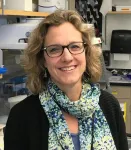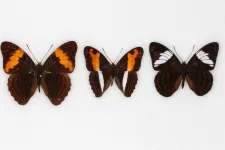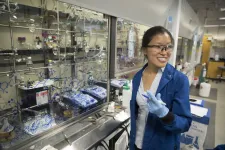New insight into how cancer spreads
Heide Ford, Ph.D., associate director of basic research at the CU Cancer Center, published a study in Oncogene investigating how cancer metastasizes
2021-03-11
(Press-News.org) Breast cancer is harmful enough on its own, but when cancer cells start to metastasize -- or spread into the body from their original location -- the disease becomes even more fatal and difficult to treat.
Thanks to new research published in Oncogene from the lab of University of Colorado Cancer Center associate director of basic research Heide Ford, PhD, in collaboration with Michael Lewis, PhD, from Baylor College of Medicine, doctors may soon have a better understanding of one mechanism by which metastasis happens, and of potential ways to slow it down.
"Metastasis is a huge problem nobody's tackled very well," says Ford, who holds the Grohne Endowed Chair in Cancer Research at the University of Colorado School of Medicine. "People don't know how to inhibit the process of metastasis, nor how to inhibit the growth of metastatic cells at secondary sites. And that's what kills most cancer patients. A lot of common drugs, whether they're targeted drugs or chemotherapies that are less targeted, do pretty well at inhibiting the primary tumor, but by the time cells metastasize, they've changed enough that they don't get inhibited by those drugs."
The transformation Ford and her team are studying happens when cells called epithelial cells, which are more adherent to one another and less likely to spread to other parts of the body, start to take on the characteristics of mesenchymal cells, which are more migratory and more likely to invade other parts of the body. This transformation is referred to as the epithelial-to-mesenchymal transition.
"When the epithelial cancer cells take on these characteristics of mesenchymal cells, they become less attached to their neighbor and they become more able to degrade membranes, so they can get into the bloodstream more easily," Ford says.
In 2017, Ford published a paper showing that the metastasis process is helped along when cells that have undergone the epithelial-to-mesenchymal transition start "talking" to cells that haven't, making those cells more likely to gain metastatic properties.
In a new paper published in December, Ford and her researchers, in a collaborative study done with Lewis and colleagues at Baylor College of Medicine, posit that the crosstalk is facilitated by a naturally occurring protein called VEGF-C.
"VEGF-C is secreted by the cells. It binds to receptors on these neighboring cells and then activates a pathway called the hedgehog signaling pathway, though it bypasses the traditional way of activating this pathway," Ford says. "That turns on a signaling mechanism that ultimately results in activation of a protein called GLI that makes these cells more invasive and more migratory."
In their new paper, Ford, Lewis and their researchers show that if you can inhibit production of VEGF-C, you can significantly slow metastasis.
"If you take out the receptor that receives the signal from the cells that have not undergone a transition, or if you take VEGF-C out of the mix, you can't stimulate metastasis to the same degree," she says. "If you remove that ability for these different cell types to crosstalk, now these cells that never underwent a transition can't move as well anymore. They can't metastasize as efficiently."
The researchers are now in the early stages of animal trials to find out the best way to target that signaling pathway in order to better inhibit metastasis. They want to find out if they can stop metastasis from happening at all, and if they can slow its progression in patients in whom the metastatic process has already begun -- and to see if they can inhibit tumor growth at the secondary site.
"For many years, people said there was no point in finding inhibitors to metastasis because by the time someone comes into the clinic, the horse is out of the barn, so to speak. The cells have already gotten out of the primary tumor and you can't do anything about it," Ford says. "But that's not necessarily true. Now, data show that if you have cells that have metastasized to a second site -- say you have breast cancer and the cells went into the lungs -- those cells that are in the lungs could in fact start metastasizing to other sites. You want to stop that process no matter where you are in this progression."
INFORMATION:
[Attachments] See images for this press release:

ELSE PRESS RELEASES FROM THIS DATE:
2021-03-11
The universe is filled with magnetic fields. Understanding how magnetic fields are generated and amplified in plasmas is essential to studying how large structures in the universe were formed and how energy is divided throughout the cosmos.
An international collaboration, co-led by researchers at the University of Rochester, the University of Oxford, and the University of Chicago, conducted experiments that captured for the first time in a laboratory setting the time history of the growth of magnetic fields by the turbulent dynamo, a physical mechanism thought to be responsible for generating ...
2021-03-11
Optical-resolution photoacoustic microscopy (OR-PAM), a new hybrid imaging technique, allows us to listen to the sound of light and see the color of biological tissue itself. It can be used for live, multicontrast functional imaging, but the limited wavelength choice of most commercial lasers and the limitations of the existing scanning methods have meant that OR-PAM can obtain only one or two different types of contrast in a single scan. These limitations have made multicontrast functional imaging time-consuming, and it's been difficult to capture the ...
2021-03-11
Ann Arbor, March 11, 2020 - Black and Hispanic people experience a higher risk for COVID-19 and severe illness, influenced by factors such as discrimination, housing, and healthcare access and utilization. Now, a END ...
2021-03-11
CHAMPAIGN, Ill. -- The chronic stress of living in neighborhoods with high rates of violence and poverty alters gene activity in immune cells, according to a new study of low-income single Black mothers on the South Side of Chicago.
The changes in stress-related gene expression reflect the body's "hunker down" response to long-term threat, a physiological strategy for lying low and considering new actions rather than launching an immediate "fight-or-flight" response. This has implications for health outcomes in communities of color and other marginalized populations, said researchers at the University of Illinois Urbana-Champaign and collaborators at the University of Kentucky and UCLA. The researchers published the study in the journal Psychoneuroendocrinology.
"The ...
2021-03-11
GAINESVILLE, Fla. --- The showy colors of some butterflies could advertise their speed and nimbleness, much like a coat of bright yellow paint on a sports car. A new study shows birds can learn to recognize these visual cues, avoiding not only butterflies they've failed to nab in the past but similar-looking species as well.
The research provides some of the strongest evidence to date for the idea of evasive mimicry, a strategy in which animals protect themselves from predators by matching the colors or patterns of agile relatives. First proposed more than 60 years ago, the hypothesis has been a challenge to test.
But in an experimental setting, ...
2021-03-11
SAN ANTONIO -- Surgically opening the windpipe, or trachea, within the first seven days of the start of mechanical ventilation decreases the time patients spend on ventilators, shortens their ICU stay and lowers their risk of ventilator-associated pneumonia, according to a systematic review published Thursday (March 11) in JAMA Otolaryngology-Head & Neck Surgery.
"We analyzed the existing medical literature to unravel a question that is very pertinent to adult critical care," said senior author Alvaro Moreira, MD, MSc, of The University of Texas Health Science Center at San Antonio (UT Health San ...
2021-03-11
The global battle against antibiotic resistance can only succeed if local contexts are taken into account. "A tailored approach is needed in each country," says Heiman Wertheim of Radboud university medical center. "There is no "one-size-fits-all' solution." This was the main finding of a study on antibiotic resistance in African and Asian countries funded by the British Wellcome Trust. Wertheim is the lead investigator of a large group of international researchers who recently published an article on this study in The Lancet Global Health.
Antibiotics are powerful treatments for bacterial infections. They are indispensable for controlling infections such as pneumonia, meningitis, or blood poisoning (sepsis) caused by bacteria. But they are ineffective for treating ...
2021-03-11
Sugar has been called "evil," "toxic," and "poison." But the body needs sugars, too. Sugar molecules help cells recognize and fight viruses and bacteria, shuttle proteins from cell to cell, and make sure those proteins function. Too much or too little can contribute to a range of maladies, including neurodegenerative diseases like Alzheimer's, inflammation, diabetes, and even cancer.
About 85 percent of proteins, including those associated with Alzheimer's and Parkinson's, are beyond the reach of current drugs. One critical and abundant sugar (O-GlcNAc, pronounced o-glick-nack) is found on over 5,000 proteins, often those considered "undruggable." But now, researchers at Harvard University ...
2021-03-11
Boston, MA - Vaccinating adults age 26 and older against the human papillomavirus (HPV)--the virus that causes more than 90% of cervical cancers as well as several other cancers--may not be cost-effective, according to a new study led by researchers at the Harvard T.H. School of Public Health.
"Our study found that the added health benefit of increasing the vaccination age limit beyond 26 years is minimal, and that the cost-effectiveness is much lower than in pre-adolescents, the target age group for the HPV vaccine," said Jane Kim, K.T. Li Professor of Health Economics and lead author of the study.
The study will be published March 11, 2021, in PLOS Medicine.
HPV vaccines have been shown to be highly effective in preventing ...
2021-03-11
Eating is a dangerous business. Naturally occurring toxins in food and potentially harmful foodborne microbes can do a number on our intestines, leading to repeated minor injuries. In healthy people, such damage typically heals in a day or two. But in people with Crohn's disease, the wounds fester, causing abdominal pain, bleeding, diarrhea and other unpleasant symptoms.
Researchers at Washington University School of Medicine in St. Louis and the Cleveland Clinic have discovered that a fungus found in foods such as cheese and processed meats can infect sites of intestinal damage in mice and people with Crohn's and prevent healing. Moreover, treating infected mice with antifungal medication eliminates the fungus and allows the wounds ...
LAST 30 PRESS RELEASES:
[Press-News.org] New insight into how cancer spreads
Heide Ford, Ph.D., associate director of basic research at the CU Cancer Center, published a study in Oncogene investigating how cancer metastasizes



